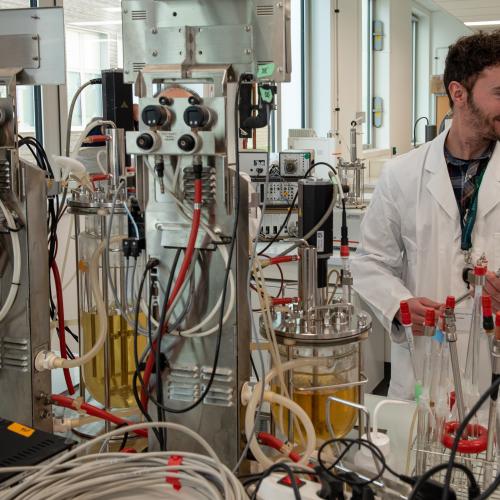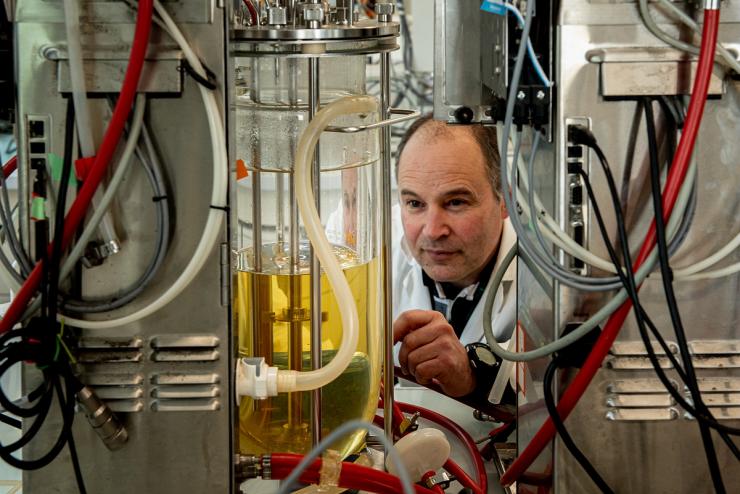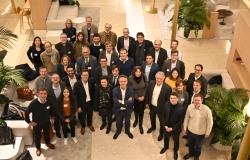Ressources dossier
Food, Global HealthIndustry invests in fermented foods
Published on 14 February 2023

Why are manufacturers interested in fermented foods?

Antoine Baule: The science of microorganisms and biotechnology in the broad sense have made huge strides and industrialists are aware of this. They are very interested in this subject, either because they produce microorganisms or because they use them. This is the case for the major dairy and cured meat industries, but also for wine and beer. There are many benefits: better selection of microorganisms to make fermented foods of good quality and better resistance, and the potential to develop new foods.

Damien Paineau: If we talk about manufacturers, we are indirectly talking about consumers. And we can see the current trend towards more natural solutions: food with a shorter list of ingredients, unprocessed or less processed food, with fewer chemical additives. We know that fermentation will make it possible to preserve food by significantly limiting the use of these additives.
AB: Yes, that’s the example of vanillin. This vanilla flavouring, which is used a lot today, comes from carbon chemistry and therefore oil. Fermentation can be used to obtain vanillin in a natural way. Many other flavours can be produced naturally, which is a big benefit of fermentation and what attracts manufacturers. Gradually, fermentation will displace ingredients obtained by organic synthesis.
Why does industry want to be involved in this vast research programme?
AB: With the aim of developing alternatives to animal proteins, industrialists want to develop new products based on plant proteins. But raw plant proteins are not fantastic from an organoleptic point of view. On the other hand, if you ferment them, you get things that can be very interesting in terms of taste and texture. Also, as the structure of plant matrices is very heterogeneous, we know very little about fermenting them on an industrial scale. Industrialists are very interested in scientific advances on this subject.
The ultimate goal is to maintain and strengten French and European leadership in a highly strategic field.
DP: This is a good example! Indeed, if a manufacturer wants to develop a cheese-type food but based on plant proteins and he realises that his first products have limitations such as protein digestibility or unsatisfactory tastes, he will turn to the Ferments of the Future platform to find a new mix of microorganisms or to develop a process that will increase the bioavailability of proteins and remove the “bad” tastes identified in his product. On the research side, we will look at our database, which lists thousands of microorganisms, and we will be able to use predictive approaches to identify groups of bacteria that could provide the benefits expected by the manufacturer. But all this is very complex! It requires a rich and well-characterised database and the development of predictive models that take into account the extremely complex relationships between microorganisms, which is a real challenge in itself. In a second phase, we will be able to test the microorganisms and the processes experimentally to ensure that the expected benefits are actually achieved.
What about research?
DP: This Grand Challenge is led by a mixed consortium of public and private players who are working together to remove scientific and technological barriers in the fields of fermentation. The aim is of course to produce knowledge, but also to work directly with manufacturers to adapt more quickly to consumer expectations, and thus accelerate innovation in the service of food transitions. The ultimate goal is to maintain and strengthen French and European leadership in this highly strategic field, which is supported by massive public and private investment throughout the world.
AB: It is the progress of science over the last 20 years that has made it possible to obtain very concrete results for industry today. The first deciphering of a yeast genome was still the result of a year’s work a few years ago, but today the technologies allow us to decipher three or four per day!
What technological equipment will be developed in Ferments of the Future?
DP: For starters, we are going to rely on the existing infrastructures of the research teams involved in this Grand Challenge. Then, we plan to set up an extremely innovative technological platform on the Saclay plateau in 2023, with the aim of launching projects in 2024. This platform, which will be unique in Europe, will be composed of three technical platforms: one dedicated to the high-throughput screening of microbial consortia with the objective of identifying the best combinations of microorganisms in relation to a predefined objective. A second platform dedicated to the development of new processes thanks to fermenters that can be used to work on very diverse matrices at different scales. Finally, an analytical platform will enable the food produced to be finely characterised in terms of sensory, nutritional and health aspects. This technological platform is at the centre of the system and its ultimate objective is to provide the industrial partner with a robust proof of concept that will enable them to continue development in their own infrastructures. It is intended to be sustainable and to operate beyond the duration of the programme.

AB: The platform will be the entry point for industrialists to all the research skills of INRAE and its scientific partners. And that is the whole point of such a public/private partnership: to do upstream research that industry cannot finance because they are more concerned with short-term objectives. The knowledge produced can be patented and find applications within industry. This is a great way of accelerating innovation!
Will the processes also be sustainable?
DP: This is in any case one of the objectives of Ferments of the Future! Today, the fermentation processes used in industry are not particularly economical in terms of energy, water, and fermentation substrates, plus they produce waste. Within the framework of Ferments of the Future, when we develop new processes, we will obviously strive to reduce their environmental impact so that not only will the food produced meet society’s expectations, but so will the way it is produced. For example, if we manage to reduce the fermentation conditions by a few degrees while maintaining good results on the products, on an industrial scale, this can be hugely beneficial to the environment.

Piloted by INRAE and ANIA, and financed to the tune of €48.3 million within the framework of France 2030, the “Ferments of the Future” Grand Challenge aims to accelerate research and innovation in the field of ferments and fermented foods. This highly strategic programme, is designed to meet the challenges of the agroecological transition and food sovereignty, and to strengthen the economic leadership of the French and European agrifood industry in a sector that focuses massive international investment.
-
Elodie Regnier
(Send email)
Author / Translated by Inge Laino
-
Damien Paineau
Executive Director of Ferments du futur Grand Challenge
